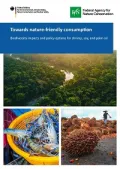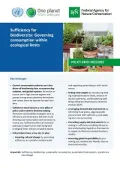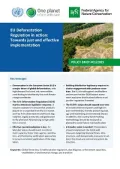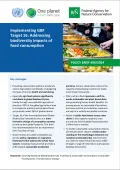Global Biodiversity Loss – Recommendations for Nature-friendly Consumption
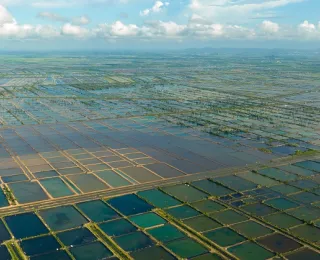
The case of shrimp, shows how the expansion of intensive aquaculture leads to the destruction of valuable mangrove forests. Over the last decade EU shrimp consumption has increased by 60% with 404,000 tons of farmed shrimp imported into the EU in 2023. The cultivation of soy, which is used mainly for animal feed, is just as problematic. EU soy imports drive land conversion and were responsible for the loss of 125,000 hectares of natural ecosystems in Brazil in 2022 alone. In the Global South, especially in biodiversity-rich regions such as savannas and the Brazilian Cerrado, a total of 4.8 million hectares of soy fields is required to meet EU import demand – an area almost the size of Slovakia. In the third case of palm oil, cultivation in tropical rainforests threatens the habitats of numerous species and causes excessive CO2 emissions through the drainage of peatlands. Palm oil cultivation for EU consumption requires about 1.5 million hectares of land.
The study shows that the severe impact of European consumption on biodiversity is the result of political and economic decisions—which also offer leverage for a shift toward nature-friendly consumption. It demonstrates how the EU can significantly reduce its biodiversity footprint through coordinated measures aimed at global justice. To do so, regulatory, fiscal, marked-based, voluntary, and trade policy instruments should be combined.
The study recommends, for example, an effective and socially just implementation of the EU Regulation on Deforestation-free products (Regulation (EU) 2023/1115) and the timely adoption of the EU Green Claims Directive. Subsidies that are harmful to nature should be abolished or reformed and replaced with incentives for sustainable consumption practices, such as those encouraging a plant-based diet. Public procurement offers significant leverage that should be used to establish obligatory biodiversity criteria. Last but not least, measures to reduce overconsumption and promote sufficiency should be taken as a basic prerequisite for a good life within the planetary boundaries.
Background
This study was developed within the project “Shaping nature-friendly consumption” and is complemented by multiple fact sheets and policy briefs. This research and development project was carried out by the Institute for Ecological Economic Research (IÖW) and the Institute for Energy and Environmental Research (ifeu) Heidelberg on behalf of the Federal Agency for Nature Conservation (BfN) and was supported with funds from the Federal Ministry for the Environment, Climate Action, Nature Conservation and Nuclear Safety (BMUKN). The results of the project are presented on November 3rd in an international online conference, organized in collaboration with the international working group “Biodiversity and Consumption” of the One Planet Network.
